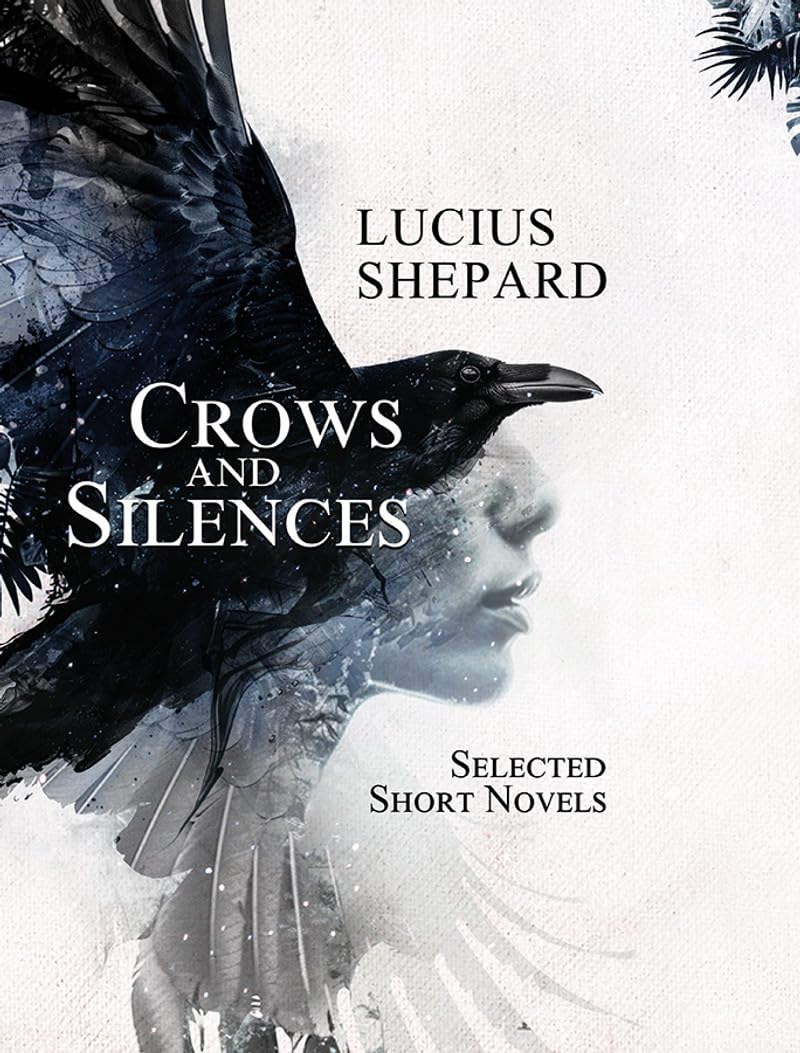Crows and Silences by Lucius Shepard: Review by Ian Mond
 Crows and Silences, Lucius Shepard (Subterranean 978-1-64524-217-8, $60.00, 520pp, hc) December 2024.
Crows and Silences, Lucius Shepard (Subterranean 978-1-64524-217-8, $60.00, 520pp, hc) December 2024.
When discussing Lucius Shepard, it’s inevitable to bemoan that despite his abundant talent, his work received little mainstream recognition. I observed this when I reviewed The Best of Lucius Shepard: Volume 2, quoting an obituary of Shepard penned by Christopher Priest for The Guardian. Priest felt that Shepard’s preference for the novella and his association with science fiction shielded him from the literary establishment. Michael Swanwick echoes this sentiment in his introduction to Crows and Silences, the latest Shepard offering from Subterranean Press, which collects four of his short novels. Swanwick points out that while the novella was Shepard’s “natural form,” it was “financially disastrous,” with Lucius having “to work constantly just to maintain his poverty.”
Yet, ten years after his death, Shepard’s work remains accessible. Thanks to the efforts of Subterranean Press and the SF Gateway, you don’t need to scour secondhand bookshops or the virtual catalogues of AbeBooks to find a ratty copy of his collections, novellas, and novels. While availability doesn’t guarantee that Shepard will have an everlasting legacy, it does, thankfully, forestall his work from fading into obscurity. The publication of Crows and Silences showcases what Shepard did best. To quote Swanwick again, “The novella was Lucius’s natural form – long enough to have the moral complexity that was the engine for his fiction, but compact enough to hit the reader like a short, sharp blow to the abdomen.”
We begin with “Kalimantan”, a novella first published in 1990. As the title suggests, the story is set in the Indonesian section of Borneo (an island also shared with Malaysia and Brunei). Our narrator is an elderly gentleman named Barnett looking back on his relationship with MacKinnon, a foolish young American who unwittingly gets involved in a Communist-led terrorist attack and, with the aid of Barnett, escapes into the deep forests of Borneo. There, MacKinnon experiments on a potent hallucinogen used by the natives, the Dayaks, which they “believe puts them in touch with the spirit world.” Except as MacKinnon and Barnett will discover, seribu does more than open the mind; it takes you elsewhere, a place outside our reality.
The pulpish plot of “Kalimantan” owes more than a nod to Conrad and Burroughs. But that’s the least interesting aspect of the story; what stands out is the unrelenting quality of the prose, graphic in its portrayal not just of the forest but of the phantasmagoric experience of taking seribu. There’s a fecundity and sharpness to the prose that’s hard to fully convey without quoting long passages of the novella. Shepard’s skill is that you never feel overwhelmed by the imagery, you never have the urge to skip paragraphs, you want to be immersed in the environment he is shaping around you. “Kalimantan” isn’t perfect. Although the story is a critique of Western imperialism, and though Barnett comes to realise that people like he and MacKinnon are leeches, exploiting the indigenous population, the Dayak never truly have a voice. The best Shepard can offer us is a waidan, a shaman woman who makes the odd pronouncement about the hubris of Western civilisation, but only in service to the plot.
“Skull City”, published the same year as “Kalimantan”, and the only piece to first feature in a magazine (Asimov’s), is also about drugs, alternate realities and a Kurtz/Marlowe-like tussle between a mentor and their protegee. The difference lies in the setting (Manhattan) and the protagonist, a drug addict who falls under the wing of Cooge, a record producer who composes music that “puts you into hell.” This other place turns out not to be the literal Hell but somewhere far more interesting, a neat wrinkle on parallel worlds. The standout feature of “Skull City”, outside of the hard-boiled prose and the Tarantino level of violence, is the sense of place, especially the evocative descriptions of Manhattan, a city Shepard knew intimately.
Shepard brings that same level of detail to the fictional “nowhere town” of Grail, the setting for “Louisiana Breakdown”. This short novel is Southern Gothic with a Wicker Man/Midsommar vibe. The town chooses a ten-year-old girl to be the Midsummer Queen every twenty years. It’s part of a bargain the founders of Grail made with the “Good Gray Man” to bring the town luck. Vida Dumars is the current Queen, and in the next twenty-four hours, she will be handing her sceptre to the new Queen, an act that will see Vida come face to face with the “Good Gray Man.” That is, unless Jack Mustaine, his BMW breaking down just outside the town boundary, can swoop in to save her.
Sex and the way it shapes and defines the power dynamics of a relationship is central to the narrative. We get a disturbing impression of how sex is used to control Vida when, at 18, she runs away to New Orleans, falling under the spell of the “witch man” Clifford Marsh. Conversely, Vida employs sex to manipulate Jack, to bring him to heel, to force him to stay in Louisiana and be her saviour. The sex scenes, of which there are several, are typically well written – Shepard struggled to write a bad sentence – except for one instance where, after a bout of lovemaking, Vida reflects that she and Jack “had vanished into one another, beamed into each other’s bodies like on Star Trek.” If “Louisiana Breakdown” is the least of the four stories featured in Crows and Silences, it’s because the opaque, messy climax leaves too much unresolved.
I had no reservations about the book’s longest short novel, “Colonel Rutherford’s Colt”. It’s a story about two gun dealers, Jimmy Roy Guy and Rita Whitelaw, business partners and lovers who specialise in weapons with a unique, often bloody history. For Jimmy, these guns are more than just curios or money makers; each has a story, one he has to bring to its completion before he will sell the weapon. When a nervous Loretta Snow comes to their table looking to offload a 1911 Colt .45 owned by her abusive dead husband, “the whitepower guy” Bob Champion, Jimmy starts to spin a narrative around the Colt, imagining a Colonel Rutherford, owner of the Colt, stationed in Cuba with his wife, whom he discovers is unfaithful. Back in the real world, Major Raymond Borchard, a white supremacist in the mould of Champion, wants the Colt and will do anything to get his hands on it.
“Colonel Rutherford’s Colt” distils all that’s great about Shepard. There are the typical obsessions with sex, violence, and morally culpable people coupled with intense, vivid prose. But we’re also treated to two magnificent characters in Jimmy and Rita, who have had to contend with years of abuse and are still working through who they are (though Rita seems more comfortable in her skin than Jimmy). Also magnificent and unexpected is how Shepard binds the two narratives, the fictional circumstances in Cuba where Rutherford is seeking revenge on his wife and lover and the real-world events where Jimmy, Colt in hand, confronts Major Raymond. If there’s a story you wish the literati had noticed in Shepard’s lifetime, plying him with platitudes and awards, it’s the remarkable “Colonel Rutherford’s Colt”. Right now, though, it’s enough that all four of these short novels are available, that Shepard’s work continues to live on.
Interested in this title? Your purchase through the links below brings us a small amount of affiliate income and helps us keep doing all the reviews you love to read!
Ian Mond loves to talk about books. For eight years he co-hosted a book podcast, The Writer and the Critic, with Kirstyn McDermott. Recently he has revived his blog, The Hysterical Hamster, and is again posting mostly vulgar reviews on an eclectic range of literary and genre novels. You can also follow Ian on Twitter (@Mondyboy) or contact him at mondyboy74@gmail.com.
This review and more like it in the February 2025 issue of Locus.
 While you are here, please take a moment to support Locus with a one-time or recurring donation. We rely on reader donations to keep the magazine and site going, and would like to keep the site paywall free, but WE NEED YOUR FINANCIAL SUPPORT to continue quality coverage of the science fiction and fantasy field.
While you are here, please take a moment to support Locus with a one-time or recurring donation. We rely on reader donations to keep the magazine and site going, and would like to keep the site paywall free, but WE NEED YOUR FINANCIAL SUPPORT to continue quality coverage of the science fiction and fantasy field.
©Locus Magazine. Copyrighted material may not be republished without permission of LSFF.









